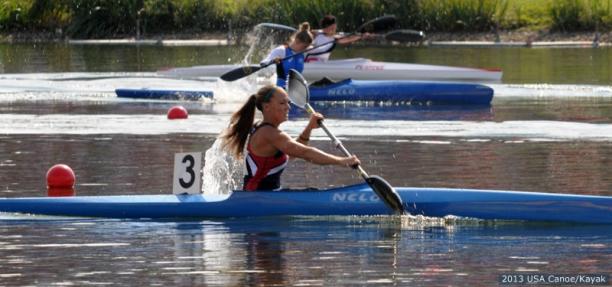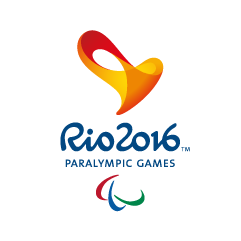Megan Blunk balances life as a two-sport athlete looking towards Rio
18.03.2015The US athlete could be a medal contender in para-canoe and has hopes to make the wheelchair basketball team.
 US athlete Megan Blunk could be a medal contender in para-canoe and has hopes to make the Rio 2016 wheelchair basketball team.
© • USA Canoe/Kayak
US athlete Megan Blunk could be a medal contender in para-canoe and has hopes to make the Rio 2016 wheelchair basketball team.
© • USA Canoe/Kayak
Blunt is not making any decisions about which roster she will be on for Rio. She has the throttle fully engaged for both sports.
There was a moment last summer, off the water and during a rare break from her para-canoe training, when it hit Megan Blunk.
“I realised that you can’t really have a life if you want to (train) like you can,” she said. “Really, you have to sacrifice pretty much everything else. Even this year during my winter break, I spent more time with my family than I have the last four years — and I felt guilty the whole time that I should be training harder.”
It is likely that feeling has been shared at one time or another by any athlete with gold-medal aspirations. But it goes double for Blunk, a 24-year-old University of Illinois graduate student with an uncommon drive — and a potential dilemma.
With para-canoe making its debut on the Paralympic programme at the Rio 2016 Games, Blunk is the best US hope for a women’s medal in the 200m kayak sprint. But she is also a member of the US women’s wheelchair basketball team, and acknowledges that something may have to give if she survives the cuts for Rio when the 2016 team is selected.
“I don’t think the coaches are going to want me going back and forth between basketball and kayaking at the Paralympics,” she said.
But Blunt is not making any decisions about which roster she will be on for Rio. She has the throttle fully engaged for both sports.
Having survived the cut to 18 players for the 2015 wheelchair basketball team in late January, Blunk has a handful of US training camps before the final 12 are chosen for August’s Toronto 2015 Parapan American Games in Canada. She is planning on sandwiching the US para-canoe trials in among those commitments — and would go straight to the World Championships in Milan, Italy, from Toronto.
If the schedule sounds frantic, there is a payoff.
“Racing at the World Championships and doing an individual sport, you really have to focus and the pressure is really on,” Blunk said. “That obviously helps when I go into basketball. And it’s good cross training. After racing last summer, I came back to basketball and was in the best shape of anyone. And when I go back to kayaking, I can focus on technique because my fitness level is high.”
It is no surprise to find Blunk juggling sports.
At Peninsula High School in Gig Harbor, Washington, she competed in football, basketball, volleyball, athletics and softball. But barely a month after graduation in 2008, she was a passenger on a friend’s motorcycle that went down a 30-foot incline and smacked into a fence. Blunk broke 18 bones and was left paralysed from the waist down.
Through two years of intense rehabilitation, Blunk regained the use of her quadriceps and can now “waddle,” as she calls it, without a walker, though balance is difficult. But movement was only a part of her challenge.
“I’d always had some depression, and I was a good athlete who didn’t really believe in myself,” she said. “I knew if I was going to be happy again, I was going to have to do something that I would have done before the accident. Being able to look forward to the goal of the Paralympics has helped me immensely.”
She gravitated to basketball first, and quickly got to a high enough level that she was offered a scholarship to play on the wheelchair team at Illinois. In 2012, needing “something to keep me motivated” during her summer break from school, she found herself at the docks of the Gig Harbor Canoe and Kayak Club.
“I knew right from the beginning we had something special,” said her coach, Alan Anderson. “Like anyone, she fell in her fair share, but it was clear she felt at ease and was relaxed on the water.”
And fast. By the following year, Blunk had earned her way to the World Championships in Duisburg, Germany, where she won silver medals in the trunk and arms (TA) classification in both K-1 (kayak) and V-1 (va’a, or outrigger) races. Last summer in Moscow, with basketball taking more of her time and a window of barely three weeks to train, she was fourth in both events.
Blunk was elated that the sport of para-canoe and the sprint kayak discipline was added for the 2016 Paralympic Games — not just for the chance to win a medal, but in the respect that it could help grow the discipline in the United States.
“And it’s getting harder for me all the time,” Blunk said. “I’m getting pulled in different directions, and it’s hard not being able to devote more time to para-canoe.
“But I love the racing aspect. I used to run track — I was always fast — and loved pushing myself as much as I can. It’s exciting to go fast again.”
John Blanchette is a sportswriter from Spokane, Washington. He is a freelance contributor to TeamUSA.org on behalf of Red Line Editorial, Inc.





















